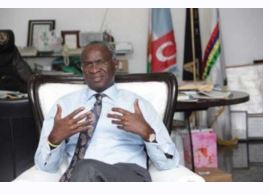P
ProfRem
Guest
The Minister of Power, Works and Housing, Mr. Babatunde Fashola yesterday unveiled federal government’s roadmap for boosting electricity generation through incremental power, saying that the government is looking at what the country could generate out of the existing power assets.
Delivering a public lecture tagged: ‘Nigeria’s Electricity Challenge: A Roadmap for Change,’ in Lagos yesterday, the minister stated that the country has 26 power plants, with three powered by water in Jebba, Kainji and Shiroro, while the rest of the plants are powered by gas.
According to him, the country has 140 turbines with installed capacity of 12,341 megawatts, adding however that at the best of times, only about 78 turbines generate power, which had resulted in February 2, 2016 peak of 5,074 MW.

Here are highlights from Fashola's lecture concerning electricity generation in Nigeria...
- The problems have been identified as either damaged, unmaintained or unserviced turbines in the hydro power plants, and in the cases of gas plants, it is largely non-availability of gas, coupled with lack of maintenance.
- Jebba Hydro power plant, which was commissioned in 1985 by President Muhammadu Buhari with six turbines to provide 540MW of power, were to be overhauled once every 5-6 years but this was never done for 28 years, until it was handed over in 2013, in the aftermath of the privatisation.
- the first overhaul has now been completed and more will be undertaken and described this effort as incremental power.
- concessionaire of Jebba and Kainji, the total available capacity of the two plants is 482 MW and 340 MW respectively totaling 822 MW. He described the plan by the investors to boost the generation to 1338 MW as incremental power.
- Azura power project meant to deliver 450 Megawatts has now started with 422 workers on site and estimated completion date of December 2018. T
This is the road to incremental power, he added.
Delivering a public lecture tagged: ‘Nigeria’s Electricity Challenge: A Roadmap for Change,’ in Lagos yesterday, the minister stated that the country has 26 power plants, with three powered by water in Jebba, Kainji and Shiroro, while the rest of the plants are powered by gas.
According to him, the country has 140 turbines with installed capacity of 12,341 megawatts, adding however that at the best of times, only about 78 turbines generate power, which had resulted in February 2, 2016 peak of 5,074 MW.

Here are highlights from Fashola's lecture concerning electricity generation in Nigeria...
- The problems have been identified as either damaged, unmaintained or unserviced turbines in the hydro power plants, and in the cases of gas plants, it is largely non-availability of gas, coupled with lack of maintenance.
- Jebba Hydro power plant, which was commissioned in 1985 by President Muhammadu Buhari with six turbines to provide 540MW of power, were to be overhauled once every 5-6 years but this was never done for 28 years, until it was handed over in 2013, in the aftermath of the privatisation.
- the first overhaul has now been completed and more will be undertaken and described this effort as incremental power.
- concessionaire of Jebba and Kainji, the total available capacity of the two plants is 482 MW and 340 MW respectively totaling 822 MW. He described the plan by the investors to boost the generation to 1338 MW as incremental power.
- Azura power project meant to deliver 450 Megawatts has now started with 422 workers on site and estimated completion date of December 2018. T
This is the road to incremental power, he added.

